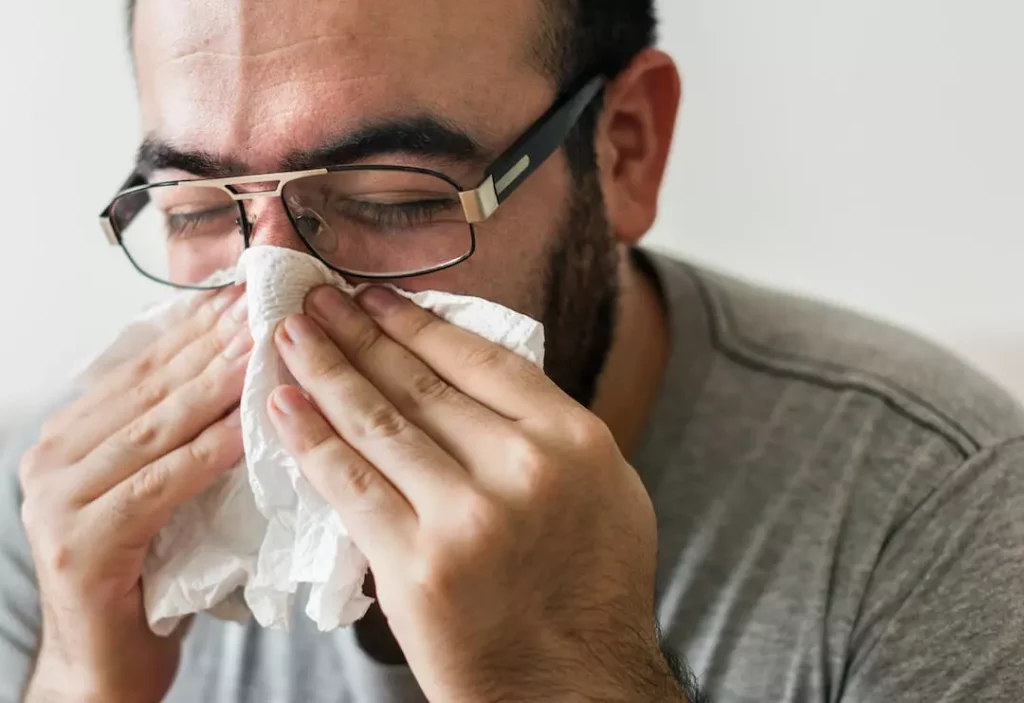Sinus is a common health condition in the USA that affects about 37 million people a year. We will explore in this article why can sinus cause tooth pain.
What is The Sinus?
Sinus (or Sinusitis) is a frequent health issue that can cause pain and pressure in the head and face. The sinuses are cavities in the bones around the nose. They are filled with air and lined with mucus membranes. The sinuses produce mucus, which helps to keep the nose moist and clean.
When the lining of the sinuses becomes inflamed or swollen, it can block the air passages and keep the mucus from draining. This can lead to pain, pressure, and a feeling of fullness in the head.

Sinus can be acute, which means it lasts for less than four weeks, or chronic, which means it can last for more than 12 weeks.
Types of Sinusitis
There are four main types of sinusitis:
1. Acute Sinuses
This is a short-term condition that usually develops after a cold or the flu.
2. Subacute Sinuses
This is a condition that lasts for four to 12 weeks.
3. Chronic Sinuses
This is a long-term condition that can last for months or years.
4. Recurrent Sinuses
This is a condition that happens several times a year.
Sinus Symptoms
Sinus can cause a variety of symptoms, depending on the cause and severity of the infection. Common sinusitis symptoms include:
1. Headache
Dull, throbbing pain in the forehead, temples, or back of the head that is worse when you bend forward.
2. Pressure in The Head
A feeling of fullness or pressure in the head, as if your head is being squeezed because of the inflammation of the sinuses.
3. Nasal Congestion
A stuffy nose due to the inflammation of the sinusitis.
4. Ear Congestion and Pain
A feeling of fullness in the ears, pain, and pressure due to the inflammation of the sinuses.
5. Cough
A dry, nagging cough that can be worse at night.
6. Fatigue
A feeling of overall tiredness and weakness.
7. Fever
A temperature of 100°F (37.8°C) or higher.
8. Pain in The Face or Jaw
Aching pain in the cheeks or jaw can be worse when you bend forward.
9. Toothache
Sinus can cause pain in the teeth, especially in the upper back teeth.
10. Bad Breath
An unpleasant taste or smell in the mouth can be a sign of a sinus infection.
11. Runny Nose
A clear or yellow discharge from the nose.

12. Swelling of the Tissues around The Eyes
The tissues around the eyes can swell due to the infection and cause discoloration.
13. Loss of Smell or Taste
A temporary loss of smell or taste can be a symptom of sinusitis.
Sinus Causes
There can be many different causes of sinus, including:
1. Allergies
Seasonal allergies can cause the sinuses to become inflamed and can lead to sinusitis.
2. Colds
Viruses that cause the common cold can also lead to sinusitis.
3. Flu
Other viruses, such as the flu, can also cause sinus.
4. Bacteria
Bacterial infections can also cause sinusitis, often after a cold or the flu.
5. Infections
Bacteria or a fungus can cause an infection in the sinuses.
6. Structural Problems
A deviated septum, nasal polyps, or other structural problems can prevent the mucus from draining properly and can lead to sinusitis.
7. Chemicals or Smoke
Exposure to strong chemicals or smoke can irritate the mucus membranes and cause sinusitis.
8. Weather
Changes in the weather can also lead to sinusitis.

Can Sinus Cause Tooth Pain?
Yes, when the sinuses become inflamed, most likely can sinus cause pain in the teeth because the sinuses are located behind the cheekbones, eyes, and forehead.
The sinuses are connected to the nose by a small opening. The pain is usually worse when you bend forward or lie down.
How can Sinus be Treated?
The best way to treat sinusitis is to identify and treat the cause. Treatment can include:
1. Taking Medications
Medicines such as decongestants, antihistamines, and pain relievers can help to reduce the symptoms of sinusitis. Your doctor may prescribe an antibiotic if you have a bacterial infection.
2. Applying Heat
Applying a warm compress to the forehead can help to relieve pain.
3. Drinking Fluids
Drinking plenty of fluids can help to thin the mucus and reduce congestion.
4. Using a Humidifier
Using a humidifier can help to add moisture to the air and reduce congestion
5. Irrigate the Sinuses
Irrigating the sinuses can help to flush out the mucus and bacteria. This can be done with a nasal rinse or with a neti pot.
6. Surgery
In some cases, surgery may be necessary to treat sinusitis. This can include removing a blockage in the nasal passages or correcting a structural problem.

How can Sinus be Prevented?
There are several ways that you can prevent sinusitis:
- Wash your hands regularly and often.
- Avoid exposure to strong chemicals, irritating fumes, or smoke.
- Stop smoking and avoid passive smoking.
- Drink plenty of fluids.
- Use a humidifier.
- Irrigate your sinuses regularly.
- Treat any allergies or colds immediately.
- See your doctor if you have any symptoms of sinusitis.
Frequently Asked Questions
1. Where sinus headaches located?
Sinus headaches are usually located in the forehead, temples, or behind the eyes.
2. Where do sinus headaches hurt?
Sinus headaches can cause pain in the forehead, temples, behind the eyes, or in the jaws.
3. Can sinus cause tooth pain in lower jaw or lower teeth?
Yes, because the sinuses become inflamed. Like how can sinus cause cause pain in upper teeth, it can also sometimes cause pain in the lower the teeth because the sinuses are located behind the cheekbones, eyes, and forehead.
4. When sinus infection needs antibiotics?
A sinus infection can sometimes require antibiotics if it is caused by a bacterial infection.
5. How much sinus surgery cost?
The cost of sinus surgery can vary depending on the type of surgery and the location. The cost of sinus surgery can range from several hundred dollars to several thousand dollars.
6. When sinus can be an alarming condition?
Sinus can be an alarming condition when it causes a high fever, severe pain, or drainage from the nose. If you have any of these symptoms, you should seek medical attention right away.

Conclusion
Sinus (also called Sinusitis) is a medical condition that can cause pain and pressure in the sinuses, ears, face, and jaw. It can also cause fatigue, fever, and bad breath.
Sinus can be caused by allergies, colds, flu, or other infections. Can sinus cause tooth pain to you? Sure, the sinus can cause pain in the teeth, especially in the upper back teeth.
The best way to treat sinusitis is to identify and treat the cause. Treatment can include taking medications like decongestants and antibiotics, applying heat or a humidifier, drinking fluids, and irrigating the sinuses.
Surgery may also be necessary in some cases.
There are several ways that you can prevent sinusitis, such as washing your hands regularly, avoiding exposure to irritants, and stopping smoking. If you have any questions about the sinus and why can sinus cause tooth pain to you, be sure to ask your doctor.
If you enjoyed reading this article, you may want to checkout Top 12 Effective Home Remedies, witch includes Tooth Pain Remedy.
References: